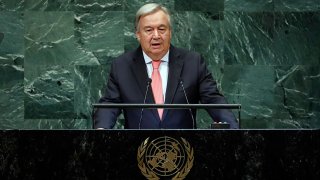
The U.N. chief appealed for a cease-fire across Myanmar ahead of Sunday’s elections to tackle surging COVID-19 cases, expressing concern at intensifying clashes including in Rakhine State where hundreds of thousands of Rohingya Muslims can’t vote because the government has denied them citizenship.
Secretary-General Antonio Guterres appealed for a global cease-fire to tackle the COVID-19 pandemic on March 23, and U.N. spokesman Stephane Dujarric said the U.N. chief was renewing his appeal on Friday to focus on combatting the surge in coronavirus cases in Myanmar.
Dujarric said the secretary-general believes “the holding of peaceful, orderly and credible elections is an important opportunity to help advance inclusive sustainable development, humanitarian action, human rights and democratic reforms, including civilian control over the military.”
Guterres also hopes the elections will “help pave the way for refugee returns in safety and dignity,” he said,
The government of Myanmar, a Buddhist-majority nation, has refused to recognize Rohingya as citizens or even as one of its ethnic groups, rendering the vast majority stateless.
Myanmar’s military began a harsh counterinsurgency campaign against the Rohingya in August 2017 in response to an insurgent attack. More than 700,000 Rohingya fled to neighboring Bangladesh to escape what has been called an ethnic cleansing campaign involving mass rapes, killings and burning of their homes -- which the government denies. Bangladesh currently houses over 1 million Rohingya refugees.
Last year, a U.N. fact-finding mission said some 600,000 Rohingya were still living in “deplorable” conditions in Rakhine state, subject to restrictions on movement that touch almost every aspect of their lives.
U.S. & World
Stories that affect your life across the U.S. and around the world.
Dujarric, the U.N. spokesman, said the secretary-general is concerned at the “legal limbo” of the Rohingya in Rakhine and their inability to vote.
“It is important that everyone have a voice and be able to participate in these elections in a very ... inclusive way,” he said.
In renewing his cease-fire appeal, the secretary-general “remains concerned about armed conflict in many areas of Myanmar, especially the intensifying clashes in Rakhine and Chin states, which continue to take a heavy toll on vulnerable civilians,” Dujarric said.
Guterres urges all combatants “to respect their obligations under international humanitarian law and to protect civilians and civilian infrastructure,” he said.
The secretary-general says unimpeded humanitarian access for the U.N. and its partners “is crucial,” Dujarric said.
In Sunday’s election, there are about 37 million registered voters though observers say turnout is expected to suffer because of the recent surge in coronavirus cases.
In 2015, hopes were high of ending more than five decades of army-directed rule.
The National League of Democracy party of Aung San Suu Kyi roared to a landslide election victory. The 75-year-old Nobel Peace Prize laureate became Myanmar’s de facto leader after many hard years at the forefront of a non-violent struggle against military dictatorships that won international admiration.
This year, her party is expected to again top the polls. But some critics feel her administration has failed to embrace democratic principles and accuse her and her party of being more concerned about entrenching their power than encouraging a broad-based democracy.



